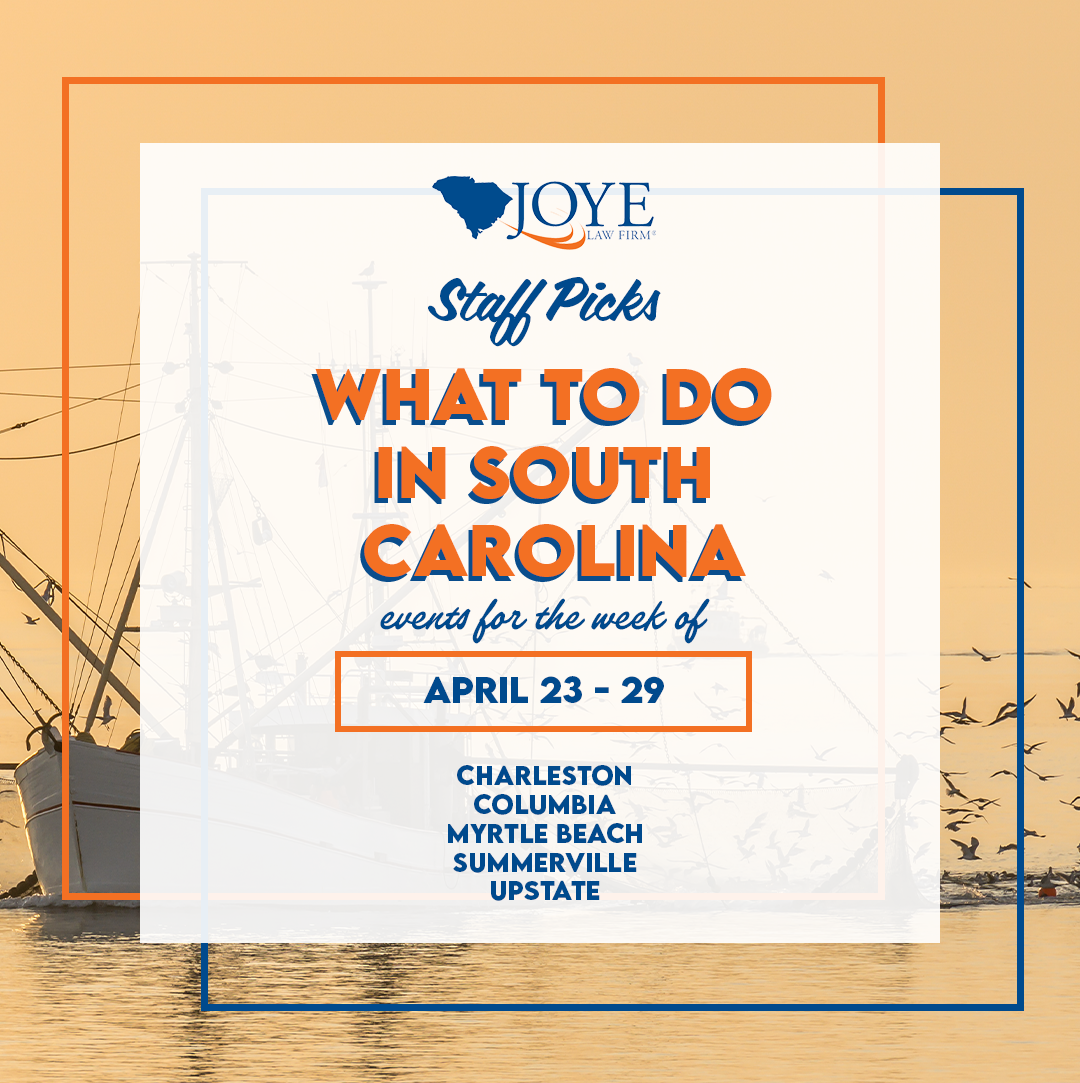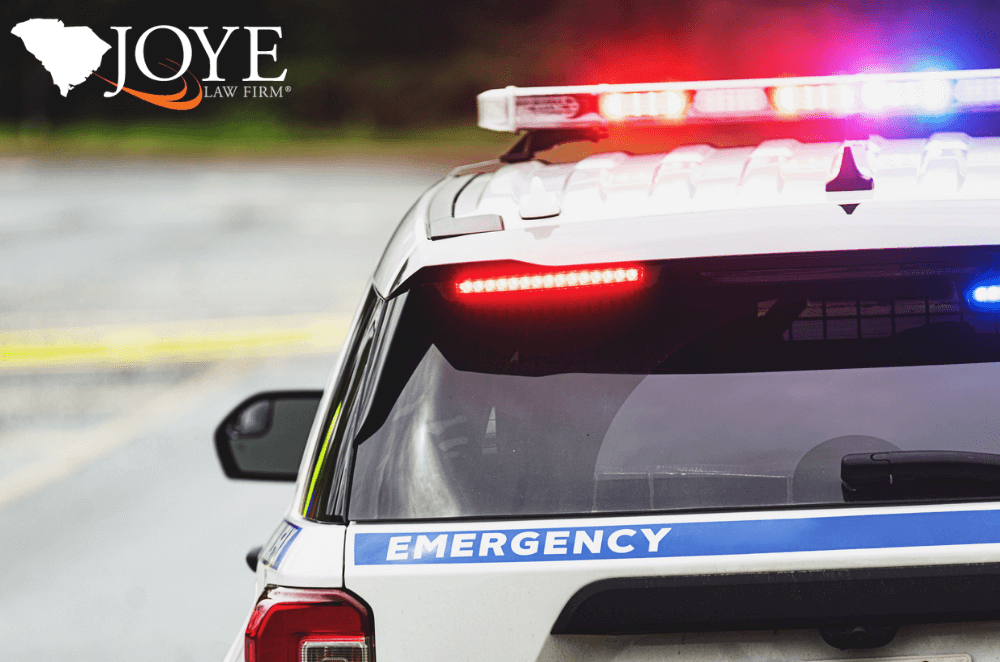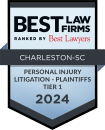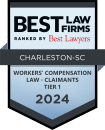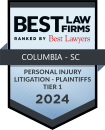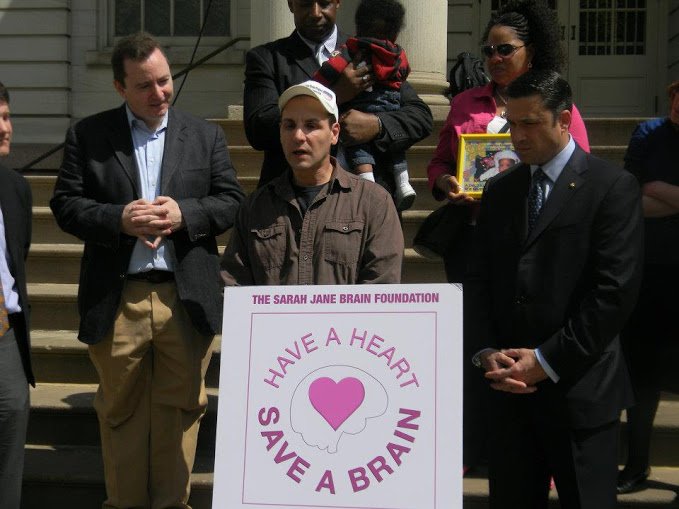
March is Traumatic/Acquired Brain Injury Month. To continue to bring light to this underrepresented issue, Joye Law Firm is honored to bring you our second interview in our series. In this interview, Craig Sears, who is a widely recognized advocate for Brain Injury Awareness, shares the adversity he had to overcome as a brain injury survivor dealing with an uneducated legal system. He outlines the many obstacles he had to face because of the lack of knowledge for TBI/ABI victims. He discusses how this has set the path in his life to educate and bring awareness to this important societal issue. He has accomplished this mission through his own personal efforts, as well as through the support of The Sarah Jane Brain Foundation. To read his full story click here.
You can also read his response to our questions below.
1. First, what led you to vocalize your story and share it with the world?
During my lifetime, I have been confronted with challenges, obstacles, and disappointments. The purpose of sharing my experiences with everyone is not to blame, shame or to point a finger in anyone’s direction. I have found that little benefit comes through such behavior. Living life on life’s terms, to me, means that I deny the notion that I am a victim of my circumstances.
2. Your story is truly moving and I encourage everyone to read you’re full Bio on Wikipedia- but for those listening could you share a bit of your story with us?
I came up over a hill and there was a car going the wrong way. It was too late. I couldn’t stop and we collided. I was thrown nearly 40 feet over on-coming traffic. I was not wearing a helmet and I landed head first into a curb, just missing a telephone pole. I have no memory of the next 6 months. That period of time is a Black Hole in my life. I was in and out of a coma, undergoing multiple surgeries. The doctors operated on my head, and did what they could to patch up my body. This was the beginning of my physical recovery.
Though my body was healing, a bigger problem went untreated. And no one realized it. Insult was added to injury. This is where I fell through the cracks. Despite having my head in a cast, no one identified the true nature of my injury as being a Traumatic Brain injury. That oversight would cost me dearly in the years to come. I had no idea of the hell I was in for. Had I known what lay ahead, I would never have fought so damn hard to make it. I would have given up, lay down and died. My struggles were constant, and I had to relearn everything. How to walk, how to talk, how to eat, how to use the bathroom; How to care for myself, and then there was the incessant pain, the physical pain of my body overcoming weakness and injury. Worse yet, there was the anguish of not knowing who I was.
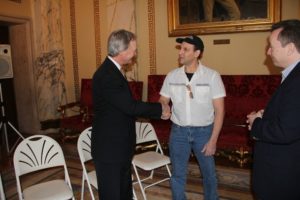
Craig meeting with legislators on TBI
Things went from bad to worse. Soon, the treatment center I was in transferred me to a mental health ward in Bridgeport Hospital. I spent the next 9 months locked in against my will, slowly regaining my memory. It was a locked ward and the doors only opened when someone came in or out. I started sneaking out when they would bring in breakfast, lunch or dinner trays. I would run to the back stairwell where the service elevators were, jump in go to the first floor and dart out the front or side door. I would get a couple hours of peace before I would get brought back by the police, because the hospital would always call them and tell them I had snuck out again. I was angry and I wanted out. I would sit by the phone for hours trying to figure out how to make a call out. I finally figured it out and began calling out to anyone who would listen to me; Town officials, State Government anyone who could get me out. While I knew I didn’t need to be there, I did know that I needed help in other areas. But the help I needed wasn’t available. This was not a mental health issue.
3. Could you tell us a little about the Sarah Jane Brain Foundation and your role in this movement?
I am now advocating in efforts to share my experiences and struggles, to offer support and encouragement, and to instill hope and a sense of faith. Advocating has given me a new sense of purpose, while I personally continue to heal and recover. I strive to help others realize that they are not “alone” in their own personal struggles.
As a Traumatic Brain Injury advocate, I am adding my support to the Sarah Jane Brain Foundations goal for creating a national model care system for children suffering from all Pediatric Acquired Brain Injuries (PABI). This program is sorely needed, and it will help thousands of children and their families overcome the difficulties following a Traumatic Brain Injury (TBI). It will also help raise awareness of TBI and help the thousands of other American adults who yearly suffer a TBI as result of accidents, falls, strokes, or by other means. And it will help protect the children of tomorrow from ever having to experience the horror and heartache of TBI. This coupled with the growing awareness that thousands of our troops returning from, Iraq and Afghanistan…. too are suffering from TBI. This injury is being called the signature wound of these conflicts.
4. Do you feel like Brain Injuries are overlooked or stigmatized in our society?
Oh yes absolutely!! For years, I felt as though no one else knew what I was going through, but believe me; Traumatic Brain injury survivors almost ALWAYS experience the same things.
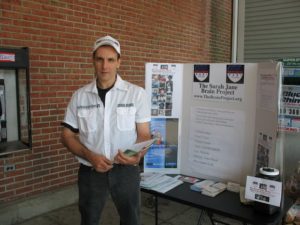
Craig helps children through The Sarah Jane Brain Project
People aren’t aware of brain injuries. No one thinks brain injuries will affect them or their children. A lot of brain injured people look perfectly normal. Imagine having a disability that caused you to slur your speech, made it difficult for you to learn new things, and affected your balance. Now imagine that no one knew you had this disability. That’s what it’s like for people living with a disability as the result of a brain injury. Brain injury is known as an invisible disability because there are often no outward physical signs of the disability. It’s not like falling and breaking a leg, where you see it and it heals. A brain injury can last a lifetime. There is no cure, only awareness and prevention. After that there’s only support.
5. What do you think is the main reward that people get from your efforts?
HOPE! To know someone is out there talking and actually speaking up.
The one and only way that a change is possible is if enough people have become fed up. But if people don’t come forward it will continue. The only way we can grow by letting people know we exist and we are fighting for everyone.
6. How do you deal with your day to day personal challenges knowing that you have to inspire others?
Day after day I get emails about the horrible things that the US States are doing to brain injury survivors. They need to be stopped; we have rights for a reason, but the State’s trample all over them as if they are immune.
7. What motivates you to continue with your work?
The kids other survivors!! The values we live for are worth more when we pass them on… I have been an active and effective advocate for the brain injury survivor community and a participant in the Acquired Brain Injury (ABI) Waiver Program for several years. Prior to obtaining waiver services, and as a result of a lack of community-based supports, I was imprisoned and institutionalized. It is my goal to continue to strive for independence with appropriate supports, and to continue my advocacy efforts for other survivors.
8. What has been the biggest challenge since you gained your voice in 2008?
Over time everyone in my family has moved out of Connecticut and they have asked me to go with them, I looked into it and was told that there is a 5 year waiting list for any ABI Services, and in order to get on the waiting list in that state that I needed to live there for 2 years before I got put on the list; been there, done that. It’s bad enough trying to find anyone that knows anything about brain injury. I’ve been a participant in the Acquired Brain Injury (ABI) Waiver Program for several years in CT and I have YET to find anyone that I don’t need to tell what to do, or anyone that does not talk down to me like I’m a 2 year old, or even try to get one over on me! I have kept in this ¨box”, where I’m very limited on what I can do. I believe that my rehabilitation has been curtailed as a result. I am frequently required to see a doctor or go into a state team meeting and prove that I am disabled.
9. Do you have any final thoughts you would like to share with our listeners?
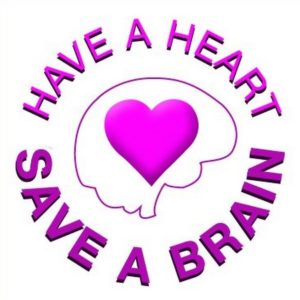
The Sarah Jane Brain Foundation
Never give up, this too shall pass – Not to give up under any circumstances should be the motto of our life: we shall try again and again, and we are bound to succeed. There will be obstacles, but we have to defy them. So do not give up, do not give up! Continue, continue! The goal is ahead of you. If you do not give up, you are bound to reach your destined goal.
“Things work out best for those who make the best out of the way things work out!”
The Sarah Jane Brain Foundation and supporters devote their lives to helping children and young adults who suffer from Traumatic Brain Injury, which is the leading cause of death and disability in the United States. I am asking you to please take five minutes and read my story and share your thoughts with as many people as you can to raise awareness of TBI to shine light on this silent epidemic. In turn, someone else who has had an experience with TBI may find some help and understanding, which they so deserve. (Chances are someone you know has experienced something very similar and can benefit from this.)
Craig Sears
The Sarah Jane Brain Foundation
New York, NY 10036
212.576.1180




